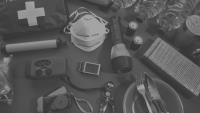 Add My Company
Add My Company
Sign In
Panic Attacks: How to Help
11-09-2023

Why do panic attacks happen?
Panic attacks can happen to anyone, without any obvious cause or warning. They can be alarming both for the person experiencing the attack and anyone trying to help.
Exams increase stress and students up and down the country will be sitting in exams halls, waiting to hear ?you can turn your papers over now?. For some, exams cause no problems at all, but for some, the fear of exams can result in full-blown panic attacks.
Certain times of life can make people more prone to panic attacks, often those going through menopause or early Alzheimer?s can result in a higher incidence. Increased stress and overload can often be contributory factors. However, there does not need to be any obvious reason, sometimes, they just happen!
What is panic?
Panic is an extreme feeling of fear and dread, and usually the overwhelming desire to escape an uncomfortable situation. Most people have experienced a sense of panic at some time in their life, it is a perfectly normal response. Some people have a history of panic attacks and know what can trigger them. For others, they can occur suddenly, with no obvious cause. Read on to learn the signs to look out for and what you can do to help.
Physical reactions may be frightening and can include the following:
A pounding and racing heart or even palpitations
Shortness of breath or a feeling of choking
Shaking, tingling or numbness in your fingers and toes
Feeling sick and dizzy
Sweating
Needing the loo
Thinking you might die
Feeling you are losing control of your mind ? even that you are going crazy
Aggressiveness, sometimes due to the wish to escape
Difficulty breathing due to panic attacks should not be confused with asthma.
Asthma
Asthma is an extremely common chronic and potentially life-threatening condition. When someone has Asthma; their airways go into spasm which causes tightness of the chest. This leads to the linings of the airways become inflamed and produce phlegm leading to severe difficulty in breathing.
If someone is having an asthma attack, they need their medication and help quickly. Whereas panic attacks are usually short-lived, and the casualty quickly makes a full recovery.
During asthma attacks, casualties wheeze and struggle to breathe out, whereas large volumes of air can be heard entering and leaving the lungs when someone is hyperventilating and having a panic attack.
How to help if someone is having a panic attack
Reassure them; they may be unable to explain what has caused them to panic and do not pressure them to do this, your calm presence should help.
Speak to them in positive, supportive terms, ?You will be okay, this will pass in a minute? etc.
Remove them from anything causing distress.
Encourage them to focus on their breathing and breathe calmly and slowly, in and out through their nose and out of their mouth.
Small sips of water may help to calm them.
Stamp on the spot. Some people find this helps control their breathing.
Try grounding techniques. Grounding techniques can help someone feel more in control. They are especially useful if experiencing dissociation during panic attacks.
Encourage them to concentrate on sounds around them
Walk barefoot
Wrap them in a blanket
Touching something or sniffing something with a strong smell.
Focus on the sensations right now. Some people keep a box of things with different textures and smells ready for when they need it.
If symptoms get worse, get medical help.
When the panic attack is over, talk it through with them. Discuss relaxation techniques and other helpful means of coping in case this happens again.
Paper bags
Do not suggest breathing in and out of a paper bag. People used to think breathing in and out of a paper bag was helpful during a panic attack. And the physiology makes sense. Breathing out in panic results in the loss of carbon dioxide in the blood and breathing into a bag restores the lost CO2.
The danger with a paper bag is that the casualty may become dependent upon it and can panic if they do not have one to hand.
It is extremely dangerous to use a paper bag with someone is having an asthma attack and can make things considerably worse.
If attacks are persistent and severe, the patient can be referred for specialist help.
For more information on Panic Attacks: How to Help talk to ABC Training Services Ltd
Enquire Now
List your company on FindTheNeedle.

